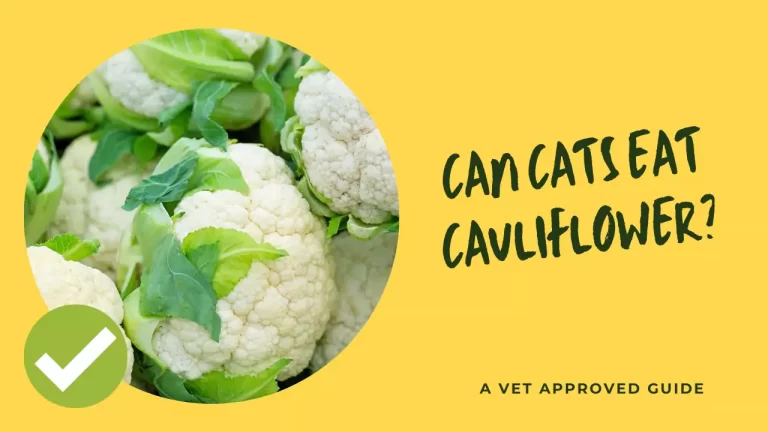Cauliflower is a healthy vegetable, but it shouldn’t be used to replace your cat’s usual food. Cauliflower is safe for cats to consume in moderation if it is cooked and sliced into little pieces. However, some cats may experience gastrointestinal distress if fed excessive amounts of cauliflower. The following is important information on giving cauliflower to your cat.
What is Cauliflower?
Cauliflower, a member of the cruciferous vegetable family alongside broccoli, cabbage, kale, and Brussels sprouts, showcases a white head. This head consists of multiple small florets tethered to a sturdy stem. You can enjoy cauliflower raw or utilize diverse cooking methods like steaming, boiling, roasting, or frying.
Nutritional Benefits of Cauliflower for Cats
Cauliflower has fiber, antioxidants, vitamins, and minerals yet little calories and fat. Cauliflower gives cats nutrients like:
- Vitamin C: It boosts immunity, fights infections, and prevents scurvy.
- Vitamin K: Blood clotting and bone health.
- Vitamin B6: It aids metabolism, neurological function, and red blood cell synthesis.
- Folate: This nutrient aids DNA and cell division.
- Potassium: It regulates fluid equilibrium, muscular contraction, and nerve transmission.
- Magnesium: Magnesium aids bone development, energy generation, and enzyme function.
- Iron: It transports oxygen and forms hemoglobin.
- Calcium: Calcium strengthens bones, muscles, and nerves.
Cauliflower includes anti-inflammatory and anti-cancer phytochemicals such as glucosinolates and sulforaphane. These chemicals lessen cats’ risk of arthritis and cancer
Risks of Feeding Cauliflower to Cats
Before feeding your cat cauliflower, be aware of the hazards. These dangers include:
- Cauliflower allergy: Some cats are sensitive to cruciferous veggies. Allergies include itching, swelling, hives, vomiting, and breathing problems. Stop feeding your cat cauliflower and call your vet if you see any of these indications.
- Digestive issues: Cauliflower fiber might help cats with constipation or diarrhea. Too much fiber may cause gas, bloating, and stomach discomfort in cats. If ingested whole, raw cauliflower may induce choking or intestinal obstruction.
- Nutritional imbalance: Cats require protein, lipids, and critical amino acids, which cauliflower does not deliver. Cats must consume meat to survive. Cats might get malnourished from eating too much cauliflower or other vegetables.
Can Cauliflower Cause Digestive Issues or Stomach Upset in Cats?
Yes, Cauliflower may upset cats’ stomachs, particularly if they consume too much or aren’t accustomed to it. Symptoms include:
- Gas: Raffinose, a sugar in cauliflower, may produce intestinal flatulence. Some cats experience flatulence, belching, or gastrointestinal pain.
- Bloating: Some cats get bloating or distension from cauliflower’s indigestible fiber.
- Diarrhea: Cauliflower may help cats pass stool. Loose stools or diarrhea may follow.
- Vomiting: Some cats get stomach aches from cauliflower. Some vomit or regurgitate.
If your cat has digestive troubles or stomach discomfort after eating cauliflower, stop feeding it and check its health. Consult your vet if symptoms worsen.
Preparing Cauliflower for Cats
To safely feed your cat cauliflower, follow these steps:
- Clean the cauliflower under running water.
- Discard leaves and stem. They can choke cats.
- Cut the head into bite-sized florets.
- Steam, boil, or microwave florets until tender. Avoid salt, butter, oil, spices, and other cat-unfriendly flavors.
- Before feeding your cat, chill the florets. Hot cauliflower might burn your cat’s lips and tongue.
- Refrigerate leftover cauliflower for three days in an airtight container. Moldy cauliflower may harm your pet.
How Much Cauliflower Can Cats Eat?
Cauliflower intake varies on cat size, age, health, and preferences. However, you shouldn’t give your cat more than 10% of its daily calories in cauliflower. If your cat requires 200 calories each day, offer it no more than 20 calories of cauliflower.
Introduce cauliflower to your cat slowly and notice its response. Start with a little portion and watch how your cat reacts and digests it. If your cat likes it, progressively increase the quantity. If your cat hates or is intolerant, stop feeding it and try another veggie.
Cauliflower is a nutritious and flavorful vegetable that may benefit cats, but it should not be fed in big numbers. Cooked, diced cauliflower is safe for cats. Some cats’ stomachs can’t handle too much cauliflower. Therefore, visit your vet before feeding your cat cauliflower and follow their feeding instructions.







